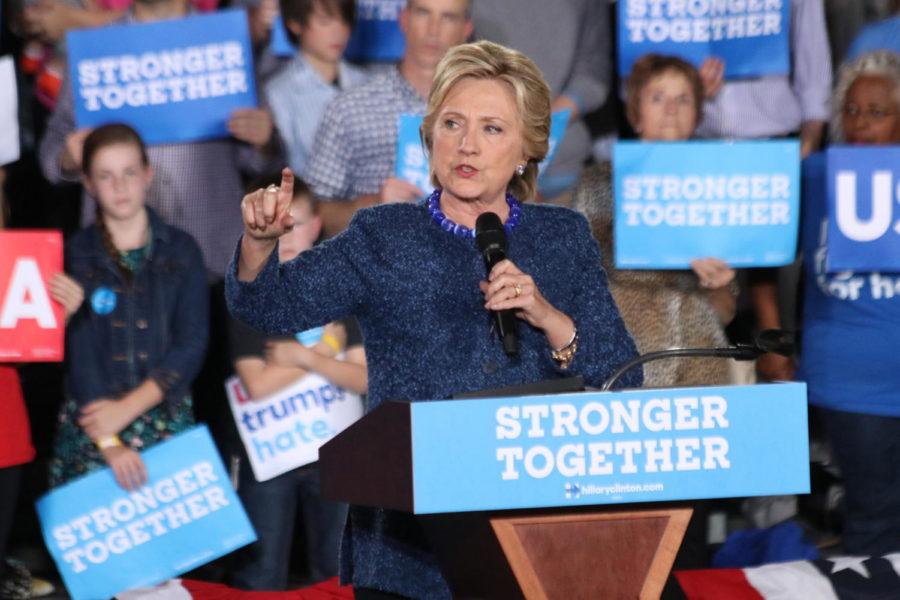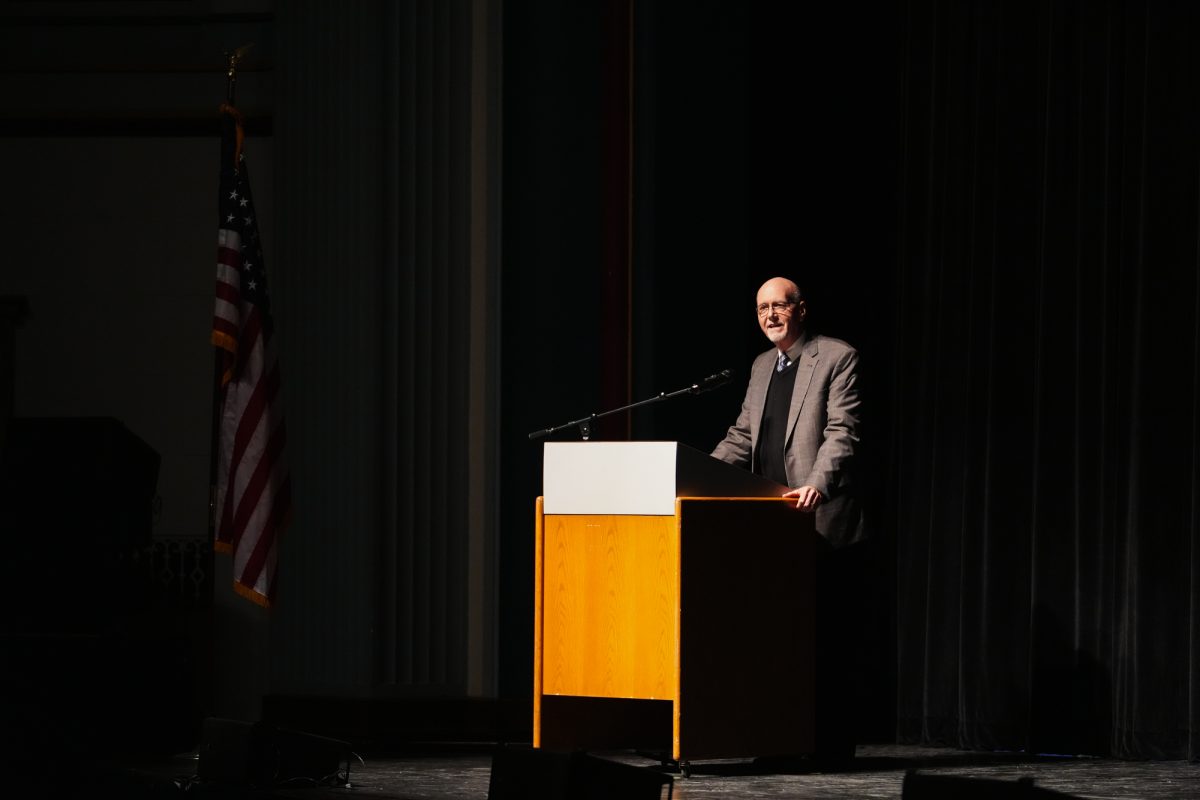The likability factor: why elections are harder on women
Chris Jorgensen/Iowa State Daily
Hillary Clinton visited Roosevelt High School in Des Moines to encourage early voting and contrast her policies to those of Donald Trump.
March 2, 2019
When it comes to winning elections, women in politics face disadvantages men do not.
Voters tend to elect candidates perceived as more likable. Politicians’ likability is a difficult term to precisely define, but it is closely related to favorability and the classic question of “could you have a beer with this candidate?”
Sen. Elizabeth Warren, D-Mass., announced that she was forming an exploratory committee for a campaign for president in 2020 on New Year’s Eve. That same day, Politico published a piece comparing a would-be Warren candidacy to that of the losing 2016 Democratic nominee, Hillary Clinton, directly bringing up questions about her likability.
In the ongoing 2020 race, a recent Morning Consult poll of the Democratic presidential primary electorate found Warren to have a net favorable rating of +39, meaning 39 percent more voters approve of her than disapprove. In that same poll, Sen. Bernie Sanders, I-VT., was found to have a net favorable rating of +61.
Sanders and Warren are perceived to have similar policy views, both being of the progressive wing of the Democratic party, yet Warren has a favorable rating that is 22 percent lower than Sanders’.
Tessa Ditonto, assistant professor of political science at Iowa State University, said perceptions of competence and compassion are important to voters.
“Women in any sort of leadership role are subject to different kinds of biases and stereotypes, largely because of our expectations regarding what women are like or are supposed to be like when compared to what leaders are like or are supposed to be like,” Ditonto said.
There are expectations around masculinity and femininity. Leaders are expected to have traditionally masculine traits, such as being aggressive, assertive and rational, even if they’re not men. However, women are expected to also have traditionally feminine traits, such as being compassionate, emotional, nurturing or focused on others, so there’s a disconnect between what people expect from women and what they expect from leaders, Ditonto said.
“Women in leadership roles, in politics, they have to walk a very fine line between being seen as strong enough to be the leader but also feminine enough to be likable,” said Kelly Winfrey, interim director of the Carrie Chapman Catt Center for Women and Politics and assistant professor in journalism.
This is referred to as the double bind — women cannot stray too far from one side of the fine line of being too feminine or too masculine when they are running for office without being perceived as unlikable.
Winfrey said women aren’t liked when they behave “incongruent to their gender role expectations,” so aggressive, strong women are generally less liked by the public than aggressive and strong men.
While Sen. Kirsten Gillibrand, D-NY, received some of the same questions regarding likability as Warren after entering the race for the Democratic presidential nomination, some of the coverage fell back to classically sexist tropes.
“Kirsten Gillibrand received some interesting commentary, particularly on Fox News after her appearance on Stephen Colbert, criticism that she was flirting with him,” Winfrey said.
During the 2016 presidential election, former Secretary of State Hillary Clinton faced Sanders in the Democratic party primaries. Sanders’ stump speech consisted of the senator displaying traditionally masculine aspects and aggressively articulating his platform, earning plaudits for his passion. Clinton defended her platform in a similar manner and was characterized as shrill.
In a debate prior to the New Hampshire primary in 2008, then-Sen. Barack Obama infamously said that then-Sen. Hillary Clinton was “likable enough.”
Obama had won the 2008 Iowa Democratic caucuses over then-Sen. John Edwards and Clinton the week before the New Hampshire primary. Clinton had long been perceived as the frontrunner in the race, however a poll taken the week of the caucuses found Obama taking the lead, despite that same poll finding Clinton with a 14 percent lead over Obama and a 16 percent lead over Edwards in response to the question “who has the experience and competence to lead.”
“Hillary Clinton is a unique case in some ways because she has so much experience in politics that there were a lot of existing opinions about her, but I still think that this applies to her,” Winfrey said. “In general, there is an incongruence between what are perceived as leadership traits and feminine traits.”
Numerous pieces were published during the 2016 presidential campaign cycle asking various iterations of the question “Why do people not like Hillary Clinton?” while the lower favorability ratings of her main opponent, now-President Donald Trump was comparatively left ignored.
“It seems to be the case that women who run for office have less room to be outside the traditional realm of being likable,” Ditonto said.
This trend has continued in the present 2020 campaign cycle, with the least favorably viewed candidate in polling of potential candidates, Howard Schultz, publicly saying he may seek the presidency as an independent. The coverage of Schultz’s would-be candidacy has thus far focused on the likelihood of an independent like Schultz winning the presidency or whether his candidacy would help re-elect Donald Trump (the same poll shows that it would).
Frank Flynn, then a professor of business at Columbia University, and Cameron Anderson, then a professor of business at New York University, ran an experiment in 2003 to test perceptions of men and women. They presented students with the real case of Heidi Roizen, an entrepreneur. For half of the students, though, they changed Heidi’s name to Howard and female pronouns to male pronouns.
The students rated both Howard and Heidi equally competent, but “Heidi was seen as selfish and not the type of person you would want to hire or work for.”
“If (women) fall too far on the side of being tough and aggressive and ambitious, the masculine side of things, they can be seen as unlikable,” Ditonto said.







